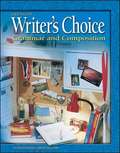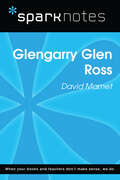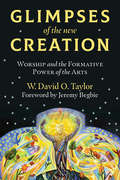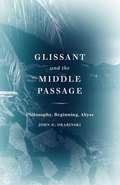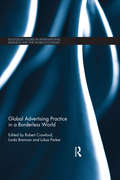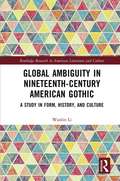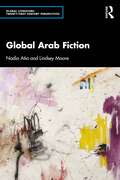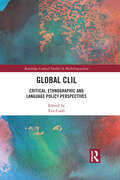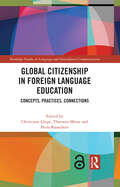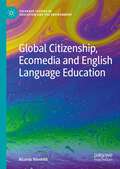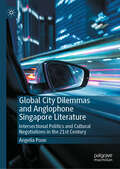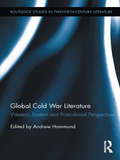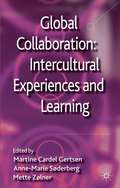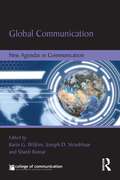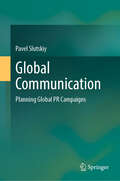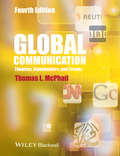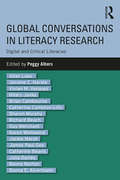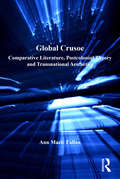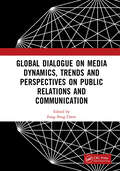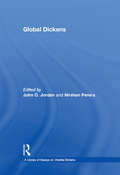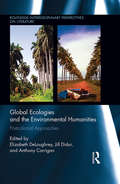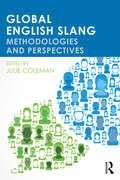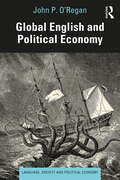- Table View
- List View
Glencoe Writer’s Choice Grammar and Composition (Grade 6)
by Glencoe Mcgraw-HillGrammar and composition textbook.
Glenngarry Glen Ross (SparkNotes Literature Guide Series)
by SparkNotesGlenngarry Glen Ross (SparkNotes Literature Guide) by David Mamet Making the reading experience fun! Created by Harvard students for students everywhere, SparkNotes is a new breed of study guide: smarter, better, faster. Geared to what today's students need to know, SparkNotes provides: *Chapter-by-chapter analysis *Explanations of key themes, motifs, and symbols *A review quiz and essay topicsLively and accessible, these guides are perfect for late-night studying and writing papers.
Glimpses of the New Creation: Worship and the Formative Power of the Arts
by Jeremy Begbie W. David O. TaylorHow do the arts in worship form individuals and communities?Every choice of art in worship opens up and closes down possibilities for the formation of our humanity. Every practice of music, every decision about language, every use of our bodies, every approach to visual media or church buildings forms our desires, shapes our imaginations, habituates our emotional instincts, and reconfigures our identity as Christians in contextually meaningful ways, generating thereby a sense of the triune God and of our place in the world.Glimpses of the New Creation argues that the arts form us in worship by bringing us into intentional and intensive participation in the aesthetic aspect of our humanity—that is, our physical, emotional, imaginative, and metaphorical capacities. In so doing they invite the people of God to be conformed to Christ and to participate in the praise of Christ and in the praise of creation, which by the Spirit&’s power raises its peculiar voice to the Father in heaven, for the sake of the world that God so loves.
Glimpses of the New Creation: Worship and the Formative Power of the Arts
by Jeremy Begbie W. David TaylorHow do the arts in worship form individuals and communities?Every choice of art in worship opens up and closes down possibilities for the formation of our humanity. Every practice of music, every decision about language, every use of our bodies, every approach to visual media or church buildings forms our desires, shapes our imaginations, habituates our emotional instincts, and reconfigures our identity as Christians in contextually meaningful ways, generating thereby a sense of the triune God and of our place in the world.Glimpses of the New Creation argues that the arts form us in worship by bringing us into intentional and intensive participation in the aesthetic aspect of our humanity—that is, our physical, emotional, imaginative, and metaphorical capacities. In so doing they invite the people of God to be conformed to Christ and to participate in the praise of Christ and in the praise of creation, which by the Spirit’s power raises its peculiar voice to the Father in heaven, for the sake of the world that God so loves.
Glissant and the Middle Passage: Philosophy, Beginning, Abyss (Thinking Theory)
by John E. DrabinskiA reevaluation of Édouard Glissant that centers on the catastrophe of the Middle Passage and creates deep, original theories of trauma and Caribbeanness While philosophy has undertaken the work of accounting for Europe&’s traumatic history, the field has not shown the same attention to the catastrophe known as the Middle Passage. It is a history that requires its own ideas that emerge organically from the societies that experienced the Middle Passage and its consequences firsthand. Glissant and the Middle Passage offers a new, important approach to this neglected calamity by examining the thought of Édouard Glissant, particularly his development of Caribbeanness as a critical concept rooted in the experience of the slave trade and its aftermath in colonialism.In dialogue with key theorists of catastrophe and trauma—including Aimé Césaire, Frantz Fanon, George Lamming, Gilles Deleuze, Félix Guattari, Derek Walcott, as well as key figures in Holocaust studies—Glissant and the Middle Passage hones a sharp sense of the specifically Caribbean varieties of loss, developing them into a transformative philosophical idea. Using the Plantation as a critical concept, John E. Drabinski creolizes notions of rhizome and nomad, examining what kinds of aesthetics grow from these roots and offering reconsiderations of what constitutes intellectual work and cultural production.Glissant and the Middle Passage establishes Glissant&’s proper place as a key theorist of ruin, catastrophe, abyss, and memory. Identifying his insistence on memories and histories tied to place as the crucial geography at the heart of his work, this book imparts an innovative new response to the specific historical experiences of the Middle Passage.
Global Advertising Practice in a Borderless World (Routledge Studies in International Business and the World Economy)
by Robert Crawford Linda Brennan Lukas ParkerCultural and regional differences in creating and managing advertising require unique responses to a dynamic, rapidly globalising business environment. To be global in advertising is no longer to be homogenised or standardised, it is to be at the leading edge of social and cultural trends that are changing the world as we know it. Global Advertising Practice in a Borderless World covers a wide range of adaptive advertising practices, from major and emerging markets, in mainstream and digital advertising. It focuses on understanding how the globalisation of advertising works in practice, explored in three sections: globalising advertising in a media and communications context; advertising in a global world; and global advertising in a digital world. Covering past, present and potential futures, through an impressive ensemble of global advertising practitioners and academics, the book combines academic rigour with practical insights to provide a comprehensive analysis of the changing dynamics between advertising and globalisation. It will be of great interest to researchers, educators and advanced students in advertising, global branding, international marketing, international business media, communication and cultural studies.
Global Ambiguity in Nineteenth-Century American Gothic: A Study in Form, History, and Culture (Routledge Research in American Literature and Culture)
by Wanlin LiAs part of a larger attempt to understand the dynamic interactions between gothic form and ideology, this volume focuses on a strong formal feature of the American gothic, "global ambiguity," and examines the important cultural work it performs in the nineteenth-century history of the genre. The author defines "global ambiguity" as occurring in texts whose internal evidence supports equally plausible and yet mutually exclusive interpretations. Combining insights from narrative theory and cultural studies, she investigates the narrative origin of global ambiguity and the ways in which it produces culturally meaningful readings. Canonical works and obscure ones from American gothic authors such as Charles Brockden Brown, Edgar Allan Poe, Nathaniel Hawthorne, Herman Melville, Louisa May Alcott, and Henry James are reexamined. This study reveals that the nineteenth-century American gothicists developed the gothic into an aesthetically sophisticated mode that engaged intensely with the pressing problems of American society, including moral citizenship, slavery, and the social status of women, and reimagined social realities in politically constructive manners. Literary scholars, students, and general readers interested in gothic literature, American literature, or narrative theory will find this book informative and inspiring.
Global Appetites: American Power and the Literature of Food
by Allison CarruthGlobal Appetites explores how industrial agriculture and countercultural food movements underpin U. S. conceptions of global power in the century since the First World War. Allison Carruth's study centers on what she terms the "literature of food" - a body of work that comprises literary realism, late modernism, and magical realism along with culinary writing, food memoir, and advertising. Through analysis of American texts ranging from Willa Cather's novel O Pioneers! (1913) to Novella Carpenter's nonfiction work Farm City (2009), Carruth argues that stories about how the United States cultivates, distributes, and consumes food imbue it with the power to transform social and ecological systems around the world. Lively and accessible, this interdisciplinary study will appeal to scholars of American literature and culture as well as those working in the fields of food studies, food policy, agriculture history, social justice, and the environmental humanities.
Global Arab Fiction (Global Literature)
by Nadia Atia Lindsey MooreGlobal Arab Fiction explores twenty-first-century fiction set in north and east Africa, the Gulf, the Arab east, and diaspora, showing diversity and connections across Arab world contexts. Nadia Atia and Lindsey Moore draw on a substantial literary corpus, highlighting contemporary trends in what is available to Anglophone audiences and considering how Arab fiction circulates as a global commodity.Global Arab Fiction begins by positioning the Arab novel as a global phenomenon. It also explores the influence of literary prizes, notably the International Prize for Arabic Fiction, on the enhanced international visibility of Arab fiction this century. The authors tackle the thorny issue of violence, in representing Arab world contexts, and spotlight queer Arab desire, identity, and community. They address the rise of speculative Arab literary modes and show how both mobility and immobility challenge a global paradigm.Global Arab Fiction illuminates a vibrant body of literature rooted in, but not circumscribed by, a region redefined by twenty-first-century global geopolitics. This book offers new arguments about twenty-first-century Arab literary tropes, modes, consecration routes, identities, and contexts. It is unmissable for readers interested in contemporary, postcolonial, Arab/Middle Eastern, and world literary studies.
Global CLIL: Critical, Ethnographic and Language Policy Perspectives (Routledge Critical Studies in Multilingualism)
by Eva CodóThis collection turns a critical lens on Content and Language Integrated Learning (CLIL) research, making the case for a sociolinguistic-informed approach towards investigating social inequalities and making visible issues, processes and actors overlooked in CLIL research. The volume seeks to expand the borders of existing CLIL scholarship through situated ethnographic perspectives, highlighting the value of a critical sociolinguistic perspective in illuminating the relationship between the emergence of CLIL and specific socio-political and economic conditions in contemporary multilingual education. Drawing on examples from Europe, Latin America, Australia and Asia, the book focuses on exploring inequities in CLIL policy and implementation across different institutional contexts and demonstrates the ways in which CLIL extends beyond the classroom as situated in multiple and changing networks of interest, policy and practice. This book will be of particular interest to students and scholars in sociolinguistics, multilingual education, language policy and planning, and applied linguistics.
Global Citizenship in Foreign Language Education: Concepts, Practices, Connections (Routledge Studies in Language and Intercultural Communication)
by Christiane Lütge Thorsten Merse Petra RauschertIn light of increasing globalization, this collection makes the case for global citizenship education as a way forward for transforming foreign language learning and teaching to better address current and future global challenges in times of unprecedented change. The volume maps a multi-dimensional approach within foreign language pedagogy to take up the challenge of "educating the global citizen". Drawing on sociocultural, pedagogical, cosmopolitan, digital, and civic-minded perspectives, the book explores the challenges in constructing epistemological frameworks in increasingly global environments, the need for developing context-sensitive educational practices, the potential of linking up with work from related disciplines, and the impact of these considerations on different educational settings. The collection reflects an international range of voices, attuned to global and local nuances, to offer a holistic compilation of conceptual innovations to showcase the relevance of global citizenship issues in foreign language education and encourage future research. This book will be of interest to scholars in intercultural education, foreign language education, and language teaching, as well as policymakers and foreign language teachers.
Global Citizenship, Ecomedia and English Language Education (Palgrave Studies in Education and the Environment)
by Ricardo RömhildThis book presents a unique framework for the inclusion of ecomedia in the English language classroom to help learners cultivate global citizenship. Foregrounding learner agency in a world at risk, the author proposes a framework that hinges on human rights and critical eco-cosmopolitanism to help learners position themselves in discourses on climate change and act for transformation. The book discusses eco-documentaries as multimodal, factional texts against the background of cutting-edge research, refuting a definition based on the binary of fiction and non-fiction. Translating the insights gained from this discussion to the language education context, learners are conceptualised as active designers of meaning making when engaged with eco-documentaries. Based on this discussion, the book puts forth an innovative, multiliteracies-informed concept which is embedded in a sustainability-oriented pedagogy of hope, which encourages learners to learn and practice languages of hope and advocacy. The book will be of interest to scholars in the fields of ecopedagogy, sustainability education, global citizenship education and cultural learning, film pedagogy and language education, as well as language educators.
Global City Dilemmas and Anglophone Singapore Literature: Intersectional Politics and Cultural Negotiations in the 21st Century
by Angelia PoonThis book looks at culturally significant, English-language texts produced in Singapore in the last 20 years by writers such as Balli Kaur Jaswal, Alfian Sa’at, Claire Tham, Amanda Lee Koe, Ng Yi-Sheng and Kevin Kwan. It provides an analysis sensitive to the writers' socio-political and cultural contexts, and shows how Singapore's Anglophone literature successfully disrupts the government’s narrative on transforming the island into a global city. By asking difficult questions, challenging hegemonic perspectives and exploring alternatives, the writers interrogate the country’s colonial history, its post-colonial Cold War development, and the normalization of totalizing narratives. Their texts also grapple with key aspects of contemporary Singapore society: its official multiracialism, forms of inequality, distribution of privilege, and gender and sexual politics. By connecting these texts to developments in postcolonial literary criticism, cosmopolitanism and globalization studies, thisbook sheds light on the ideological and cultural forces at work in Singapore society today.
Global Cold War Literature: Western, Eastern and Postcolonial Perspectives (Routledge Studies in Twentieth-Century Literature #Vol. 3)
by Andrew HammondIn countries worldwide, the Cold War dominated politics, society and culture during the second half of the twentieth century. Global Cold War Literatures offers a unique look at the multiple ways in which writers from Asia, Africa, Europe and North and South America addressed the military conflicts, revolutions, propaganda wars and ideological debates of the era. While including essays on western European and North American literature, the volume views First World writing, not as central to the period, but as part of an international discussion of Cold War realities in which the most interesting contributions often came from marginal or subordinate cultures. To this end, there is an emphasis on the literatures of the Second and Third Worlds, including essays on Latin American poetry, Soviet travel writing, Chinese autobiography, African theatre, North Korean literature, Cuban and eastern European fiction, and Middle Eastern fiction and poetry. With the post-Cold War era still in a condition of emergence, it is essential that we look back to the 1945-89 period to understand the political and cultural forces that shaped the modern world. The volume’s analysis of those forces and its focus on many of the ‘hot spots’ – Afghanistan, Iran, North Korea – that define the contemporary ‘war on terror’, make this an essential resources for those working in Postcolonial, American and English Literatures, as well as in History, Comparative Literature, European Studies and Cultural Studies. Global Cold War Literatures is a suitable companion volume to Hammond's Cold War Literature: Writing the Global Conflict, also available from Routledge.
Global Collaboration: Intercultural Experiences and Learning
by Martine Cardel Gertsen Anne-Marie Søderberg Mette ZølnerOffers qualitative studies of collaboration processes conducted in globalising companies based in Denmark and with subsidiaries in Asia. It addresses the specific contexts of collaboration and studies how people with different cultural backgrounds work together, both face-to-face and in the virtual workplace.
Global Communication: New Agendas in Communication (New Agendas in Communication Series)
by Shanti Kumar Joseph D. Straubhaar Karin G. WilkinsThis volume interrogates what "global" means in the context of "communication," and who benefits from global communication practices and industries. Emerging scholars contribute their unique perspectives in communication scholarship, charting innovative directions for research that connects empirical evidence with pressing questions of social significance. This critical reflection leads to considering problems that result from the way global communication becomes mobilized, in the practice of journalism and development as well as the ICT industry. Global Communication defines the term "globalization," through understanding the cultural geography of global, regional, national, and local media. Critical evaluations of media production, distribution, and consumption practices, within cultural contexts, offer insights into how people "mediate" the global. Chapters draw attention to communications in Latin America, the Arab World, and South Asia, complicating territorial boundaries and exploring how local audience and industry practices work within global as well as local configurations.
Global Communication: Planning Global PR Campaigns
by Pavel SlutskiyThis textbook equips students with essential media and communication skills for today&’s interconnected world. Developed as a key companion text for the Global Communication Project (GlobCom), an initiative spanning five continents, the book presents the key concepts that underpin effective communication on a global scale and guides the reader through project development, covering cross-cultural communication processes and virtual collaboration dynamics. In today&’s rapidly evolving global communication landscape, professionals with expertise in global public relations (PR) are in high demand. For students looking to develop their global PR competences, the GlobCom Project offers an authentic experience aligned with industry expectations and is a platform for related courses to draw from. This textbook provides both theoretical and practical material to enhance students&’ learning experience, and serves as a valuable resource for lecturers and advanced undergraduate and graduate students in the media, marketing communication, and PR fields. By offering insights into the complexities of international communication, it helps aspiring and current professionals become skilled and globally aware in their approach to global communication.
Global Communication: Theories, Stakeholders and Trends
by Thomas L. McPhailGlobal Communication is the most definitive text on multi-national communication and media conglomerates, exploring how global media influences both audiences and policy makers around the world. This new edition is comprehensively updated to reflect the many fast moving developments associated with this dynamic field. A new edition of the most definitive text on multi-national communication and media conglomerates, each chapter updated with extensive new details Covers the expanding area of global communication and describes major multimedia conglomerates, particularly in the USA, including the purchase of NBC-Universal by Comcast and Disney's expansion in China Includes new information on the phone hacking scandal by News Corporation’s employees in the UK Explains the significant changes in the communication industry both in the US and elsewhere Chronicles the continuing story of the development of Arab Media with new coverage on the Arab Spring Offers an updated companion website with instructor's manual, test banks and student activities, available upon publication at www.wiley.com/go/mcphail
Global Conversations in Literacy Research: Digital and Critical Literacies
by Peggy AlbersIn this volume, renowned literacy and language education scholars who have shaped policy and practice aimed toward social justice and equity address current intellectual and practical issues in the teaching of literacy in classrooms and educational environments across diverse and international settings. Drawn from talks that were presented live and hosted by Global Conversations in Literacy Research (GCLR), an online open-access critical literacy project, this book provides access, in edited written form, to these scholars’ critically and historically situated talks. Bringing together talks on diverse topics—including digital and media literacy, video games, critical literacy, and ESOL—Albers preserves the scholars’ critical discourses to engage readers in the conversation. Offering a broad and expansive understanding of what literacy has to offer for scholars, teachers, and students, this book demonstrates the importance of positioning literacy as a social practice and brings critical literacy to a global audience.
Global Crusoe: Comparative Literature, Postcolonial Theory and Transnational Aesthetics
by Ann Marie FallonGlobal Crusoe travels across the twentieth-century globe, from a Native American reservation to a Botswanan village, to explore the huge variety of contemporary incarnations of Daniel Defoe's intrepid character. In her study of the novels, poems, short stories and films that adapt the Crusoe myth, Ann Marie Fallon argues that the twentieth-century Crusoe is not a lone, struggling survivor, but a cosmopolitan figure who serves as a warning against the dangers of individual isolation and colonial oppression. Fallon uses feminist and postcolonial theory to reexamine Defoe's original novel and several contemporary texts, showing how writers take up the traumatic narratives of Crusoe in response to the intensifying transnational and postcolonial experiences of the second half of the twentieth century. Reading texts by authors such as Nadine Gordimer, Bessie Head, Derek Walcott, Elizabeth Bishop, and J.M. Coetzee within their social, historical and political contexts, Fallon shows how contemporary revisions of the novel reveal the tensions inherent in the transnational project as people and ideas move across borders with frequency, if not necessarily with ease. In the novel Robinson Crusoe, Crusoe's discovery of 'Friday's footprint' fills him with such anxiety that he feels the print like an animal and burrows into his shelter. Likewise, modern readers and writers continue to experience a deep anxiety when confronting the narrative issues at the center of Crusoe's story.
Global Dialogue on Media Dynamics, Trends and Perspectives on Public Relations and Communication: Proceedings of the International Conference on Public Relations and Media Communication, (PRMC 2024), June 28-30, 2024, Beijing, China
by Fong Peng ChewThis book contains the proceedings of the International Conference on Public Relations and Media Communication (PRMC 2024) which explore the dynamic intersections of public relations and media in today’s rapidly evolving landscape. It has a repository of innovative research, insightful discussions, and emerging trends in digital media strategies, crisis communication, media ethics, public relations in the age of social media, and the impact of emerging technologies on media practices. It touches upon a wide array of topics and provides a comprehensive overview of the latest advancements and challenges in these fields. With innovative research contributions and case studies from around the world, this book will be instructive in shaping the way we look at the world of media and ourselves. This is a highly useful guide for university professors, research scholars, writers, journalists and media professionals who wish to stay updated on the recent shifts in public relations and media communication
Global Dickens (A Library of Essays on Charles Dickens)
by Nirshan PereraThis volume of essays provides a selection of leading contemporary scholarship which situates Dickens in a global perspective. The articles address four main areas: Dickens's reception outside Britain and North America; his intertextual relations with and influence upon writers from different parts of the world; Dickens as traveller; and the presence throughout his fiction and journalism of subjects, such as race and empire, that extend beyond the national contexts in which his work is usually considered. Written by leading researchers from diverse countries and cultures, this is an indispensable reference work in the field of Dickens studies.
Global Ecologies and the Environmental Humanities: Postcolonial Approaches (Routledge Interdisciplinary Perspectives on Literature)
by Edited by Elizabeth DeLoughrey, Jill Didur, and Anthony CarriganThis book examines current trends in scholarly thinking about the new field of the Environmental Humanities, focusing in particular on how the history of globalization and imperialism represents a special challenge to the representation of environmental issues. Essays in this path-breaking collection examine the role that narrative, visual, and aesthetic forms can play in drawing attention to and shaping our ideas about long-term and catastrophic environmental challenges such as climate change, militarism, deforestation, the pollution and management of the global commons, petrocapitalism, and the commodification of nature. The volume presents a postcolonial approach to the environmental humanities, especially in conjunction with current thinking in areas such as political ecology and environmental justice. Spanning regions such as Africa, Asia, Eastern Europe, Latin America and the Caribbean, Australasia and the Pacific, as well as North America, the volume includes essays by founding figures in the field as well as new scholars, providing vital new interdisciplinary perspectives on: the politics of the earth; disaster, vulnerability, and resilience; political ecologies and environmental justice; world ecologies; and the Anthropocene. In engaging critical ecologies, the volume poses a postcolonial environmental humanities for the twenty-first century. At the heart of this is a conviction that a thoroughly global, postcolonial, and comparative approach is essential to defining the emergent field of the environmental humanities, and that this field has much to offer in understanding critical issues surrounding the creation of alternative ecological futures.
Global English Slang: Methodologies and Perspectives
by Julie ColemanGlobal English Slang brings together nineteen key international experts and provides a timely and essential overview of English slang around the world today. The book illustrates the application of a range of different methodologies to the study of slang and demonstrates the interconnection between the different sub-fields of linguistics. A key argument throughout is that slang is a function played by specific words or phrases rather than a characteristic inherent in the words themselves- what is slang in one context is not slang in another. The volume also challenges received wisdom on the nature of slang: that it is short-lived and that slang is restricted to verbal language. With an introduction by editor Julie Coleman, the topics covered range from Inner City New York slang and Hip Hop Slang to UK student slang and slang in Scotland. Authors also explore slang in Jamaica, Australia, New Zealand, India and Hong Kong and the influence of English slang on Norwegian, Italian and Japanese. A final section looks at slang and new media including online slang usage, and the possibilities offered by the internet to document verbal and gestural slang. Global English Slang is an essential reference for advanced undergraduates, postgraduates and researchers working in the areas of lexicology, slang and World Englishes.
Global English and Political Economy (Language, Society and Political Economy)
by John P. O'ReganIn this book, John O’Regan examines the role of political economy in the worldwide spread of English and traces the origins and development of the dominance of English to the endless accumulation of capital in a capitalist world-system. O’Regan combines Marxist perspectives of capital accumulation with world-systems analysis, international political economy, and studies of imperialism and empire to present a historical account of the ‘free riding’ of English upon the global capital networks of the capitalist world-system. Relevant disciplinary perspectives on global English are examined in this light, including superdiversity, translanguaging, translingual practice, trans-spatiality, language commodification, World Englishes and English as a Lingua Franca. Global English and Political Economy presents an original historical and interdisciplinary interpretation of the global ascent of English, while also raising important theoretical and practical questions for perspectives which suggest that the time of the traditional models of English is past. Providing an introduction to key theoretical perspectives in political economy, this book is essential reading for advanced students and researchers in applied linguistics, World Englishes and related fields of study.
